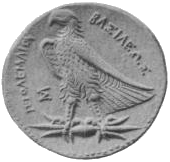Aetos Dios

The "Aetos Dios" (Ancient Greek: άετός Διός) is translated from Greek into "Eagle of Zeus". There are two schools of thought regarding the origin of this eagle, coming from different Greek legends.
Periphas
.jpg)
According to Antoninus Liberalis, Periphas was a legendary king of Attica who was a just king, and a dutiful priest of Apollo. Zeus however became indignant because Periphas was revered and honoured as if he were Zeus himself, so Zeus wanted to destroy Periphas and his entire household. But Apollo interceded, and instead Zeus transformed Periphas into an eagle, making him king of all birds and guard of his sacred sceptre.[1]
Aetos Dios as creation of Gaia
In other accounts the eagle was in fact an ancient creation of the goddess Gaia. He appeared before Zeus at the start of the Titanomachy. Zeus took this to mean a good omen of victory, leading to him using the emblem of a golden eagle on his war standard:
"...For so happy an omen, especially since victory did ensue, he made a golden eagle for his war standards and consecrated it to the might of his protection, whereby also among the Romans, standards of this kind are carried." — a translated excerpt from Fulgentius' "Mythologies" (Mythologiarum Libri III)
Notes
- ↑ Antoninus Liberalis, Metamorphoses 6, pp. 118–121; Cook 1925, pp. 1121 ff..
References
- Antoninus Liberalis, The Metamorphoses of Antoninus Liberalis: A Translation with Commentary, Edited and translated by Francis Celoria, Psychology Press, 1992. ISBN 9780415068963
- Cook, Arthur Bernard 1925, Zeus: A Study in Ancient Religion, Volume 2, Part 2, Cambridge University Press, 2010. ISBN 9781108021319.
- Smith, William; Dictionary of Greek and Roman Biography and Mythology, London (1873). "Periphas 5."